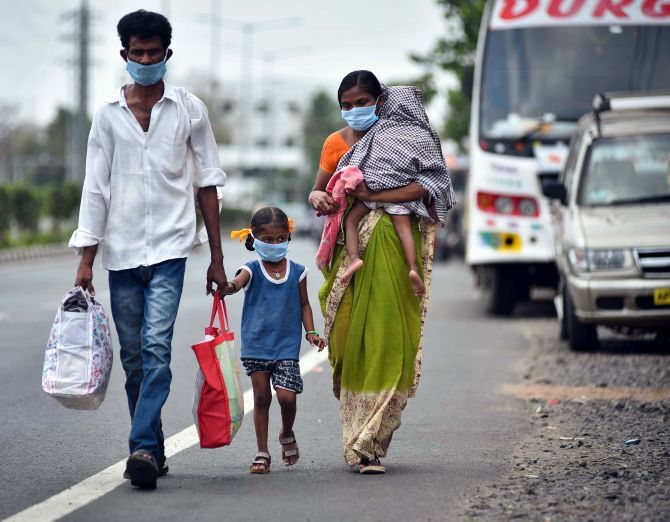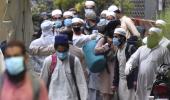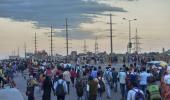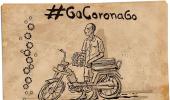Coronavirus is the biggest story of our lives and a billion plus people expect us to be around, watching, reporting, editing, recording this for posterity and blowing the whistle to draw attention to injustices and State failures, notes Shekhar Gupta.

You have to be reckless, even impertinent and a little nutty to steal the headline of your column from Gabriel Garcia Marquez.
The truth is, we journalists are usually all three of these.
If we are also generally forgiven for these flaws and more, it is because people, by and large, know where we are coming from.
In so many years, in fact, decades, in journalism, I have never been treated rudely or in an uncivil manner by almost anyone, even those who might have had reason to be angry.
In riots, insurgencies, calamities, election campaigns, we journalists find we are generally treated well, and with respect.
Even the rough guys, whose cause might need them to kill with passion, would often share their meals with you, escort you to safety.
The odd exception apart. There is honour among thieves.
Where does this come from? Who taught the billion-plus people of this vast and diverse nation that journalists are important to them? That they are decent folk they can trust the stories of their lives with, even political views.
If you travel during election campaigns, you'd be struck by how welcoming and generous people are to journalists they may have never known.
It is remarkable how forthcoming even the women in the poorest villages have become.
This is a unique social contract between the people of India and their journalists.
The bedrock of this is their belief that we do our jobs diligently and bravely.
That's why the first call so many aggrieved people across the country make, when the government or the police aren't listening to them, is to a media organisation.
All these are exactly the expectations they have from us as we now deal with what could be the biggest story of our lives, the coronavirus threat.
We, the kinship of Indian journalism, will be tested as never before.
Future generations of Indians will hold us to this.
Let's recall that famous World War-I British recruitment poster: Daddy, what did YOU do in the Great War?
It is that kind of a moment for us.
This is a deadly global pandemic.
Every country is caught in its own problems, every man for himself.
In his address to the nation on Thursday, the prime minister made an important point: That today, no country is in a position to help another.
India is alone in this.
We have a complex, messy country with lots and lots of people less privileged and resourceful than us.
One of the great gifts of India to us journalists is the respect and freedoms we are instinctively given.
We must remember where the social contract I mentioned earlier comes from.
The freedom of the press is hardly codified by any law or the Constitution.
Article 19 applies to each citizen equally and accords no special rights to us journalists.
Until Indira Gandhi's Emergency, we took our freedoms for granted.
And when she took it all away, there was nowhere to go to.
Not even to the courts.
It is, then, that the people of India, enormously poorer and less literate than today, realised that among the things she had stolen from them was a free press.
That it was a particularly cheap thing for her to do.
That it would never want any establishment to be able to do so.
That's where this social contract came from.
This is the equivalent of the First Amendment for Indian journalism.
But, if they so value and protect our freedoms, they will also judge whether we justify them or not.
I hear you, fellow journalists, when some of you express fears.
No one, at least no one sensible, is ever totally fearless.
Fear is good and self-preservation a vital instinct.
As old wisdom goes, jaan hai, toh jahaan hai (the world matters to me only if I am alive).
No one need be reckless. Experience taught me this wading through troubled and violent places in my years as a danger-junkie.
The last thing any decent newsroom leader would want is to expose anyone to undue risk.
But we are journalists.
As the biggest story of our lives plays out, there are a billion-plus people enormously more fearful and less protected than us.
They expect us to be around, watching, reporting, editing, recording this for posterity, and blowing the whistle to draw attention to injustices and state failures.
In situations like this wretched coronavirus calamity, we journalists are the first responders of justice -- and history.
If we fail to do so, it will be a failure so colossal that we might as well stop calling ourselves journalists.
And mind you, just because some of us fail this test, not everyone will.
Some honourable people from our professional clan will shine.
The future generations will forever have some journalists of this era to admire.
Those who miss out won't be forgotten easily.
Just that they won't be remembered in the way they'd wish to be.
I have always believed that everything ultimately turns out to be "less worse" than it seems to begin with.
I've been right always, with one exception: The tsunami.
I'd say, all of us will survive this and have stories to tell through the rest of our lives.
We journalists are like cockroaches, and this isn't meant to be an insult to the poor insect.
It is just that, like them, we shall survive anything.
Someone asked me a good question in the newsroom in this stressful week.
What if things turned real bad and some of us also died while on the story? The answer is simple: Even in the most unlikely event of such a thing happening, there will be some journalists covering the story.
Journalism will do its job.
Twice in his speech, the prime minister listed the media among essential services, like doctors, hospital staff, police, and government officers.
Frankly, it's a happy change to be described as an essential service.
In the decades we were growing up, we were mostly described as a pestilence!
We must believe we are important and provide an essential service.
Our pride, our self-esteem, our sense of destiny all emanate from that one belief: That we matter.
Issues with the establishment, we will always have.
But who, in which democracy, doesn't?
Watch the insults Donald J Trump routinely hurls at the finest American bylines and the greatest institutions in global media.
Or, take inspiration from the BBC when, in the midst of the Falklands War, Margaret Thatcher attacked it for not being patriotic enough and treating the two antagonists equally.
'The BBC needs no lesson in patriotism from the present British conservative government,' said Richard Francis, who then headed BBC Radio. 'The widow of Portsmouth is no different from the widow of Buenos Aires.'
We will keep questioning and irritating governments.
They will retaliate. This game will go on.
Just that the intensity or nastiness will vary from one regime to another.
But, a crisis like this should make us toss those worries away for now.
So, fasten your seat belts. Journalism in the time of corona is a story like no other yet.
By special arrangement with The Print












 © 2025
© 2025